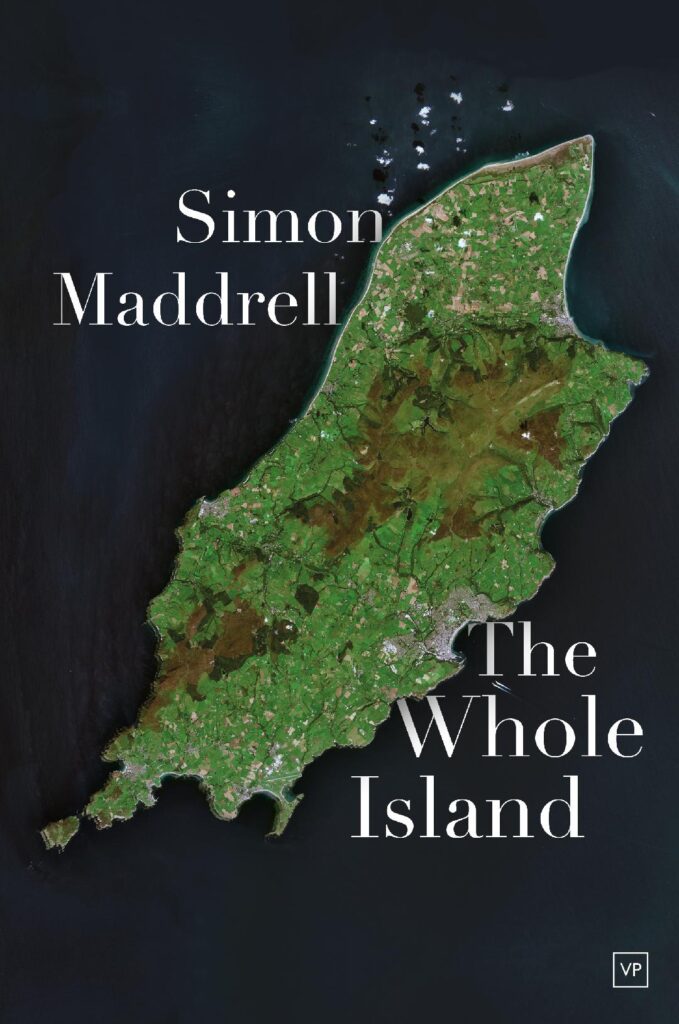
At the Edge of Language
Simon Maddrell, The Whole Island
There are some diamonds that are mostly black because their unique crystalline structure absorbs most of the light. Change your perspective as you look at them and it seems that different parts flash with different qualities of light shrouded in shadows.
This pamphlet is a necklace made of such jewellery. It speaks of flashes of light in the surrounding shadows. They are poems of foddeeaght, a Manx word which Maddrell, in a note, defines as ‘the Homesickness, nostalgia and longing’ of someone who lives in exile ‘his lost humanity / inflicting wounds on the Otherworld’. [Manannan mac y Leir]. ‘Our dialects soaked in spes altera’ [For The Future Manx Explorer], words lost which have to be translated in notes page by page. In ‘Our language drips’ Maddrell writes,
I must
return to the isle of my birth
before I become my own extinction.
And it is language that ‘that restores our place’
that speaks lounder than any plinth
and when it cries deepens the sea.
Almost every line here is an evocation of a past to which there can be no return and which is infused with a subtle glow of reality, which could almost be a definition of life itself,
like that ghostly hulk where those onboard only see
Death and Life-in-Death thrive. We may grieve, but
not as those who have no hope on a nameless ship. [Shipwrighting]
Namelessness is a preoccupation here, the loss of language, of the Manx language like the ‘clear Manx whiskey that lost its name in court for not being brown and now it’s called Manx Blue’. [Yn Slane Ellan] Indeed,
Our native Yn Gaelg
was nearly silenced
from what only it can express [Our language drips]
There are many graves and much grieving here yet these pieces are hardly works of sadness. Death is what surrounds its other which has to be celebrated and lived as embodied. Here the Isle of Man acts as a parallel – I hesitate to write metaphor – of bodily existence for,
on the edge of everywhere
there is always something new
and all the scenes we’ve played before
never feel the same [Treisht]
but we have to live nonetheless, ‘All of this is to say, that some drown in the sea and some drown on land, whilst others just love to swim’. [Yn Slane Ellan]
Dare one write of exile, of the impossibility of return because otherness is irreversible?
But you came back just the same, and are in fact
still here, even so long since you went away. [Puffin Mother]
like the young man now out, like ‘a drag queen / owning herself [The Vikings didn’t need roads] even the ‘island is almost too old to define itself’ [Yn Slane Ellan] and how beautifully this longing, this alterity is evoked. Here, again from ‘Yn Slane Ellan’: ‘The whole of the island lay before us…
Heeyn y slane ellan roin. The daily mist, the nightly fog, the wet is
always fifteen minutes from the sun and twelve minutes from
the wind. All the land’s weather is underfoot, but on the sea it floats
& swirls & sinks. Complacency is our greatest risk.
To sum up, perhaps,
South of Eary Cushlin, the hen harrier soars above the hollow where
the chapel lies, evading persecution like the monks of old, feeding
on meadow pipits & voles. On the edge of extinction, on the edge of
the whole island, the edge of our language hovers.
Perhaps it is above all in poetry that this can be achieved and Maddrell is one of its spokespersons.
The Whole Island is available from Simon Maddrell directly or Valley Press for £8.99
David Pollard’s doctoral thesis was published as: The Poetry of Keats: Language and Experience. He has also published A KWIC Concordance to the Harvard Edition of Keats’ Letters, a novel, Nietzsche’s Footfalls and eight volumes of poetry, patricides, Risk of Skin, Self-Portraits, bedbound, Finis-terre, Three Artists, Broken Voices and Bird of Oblivion. He has appeared in learned journals and many reputable poetry magazines.
X: @davpol8112
